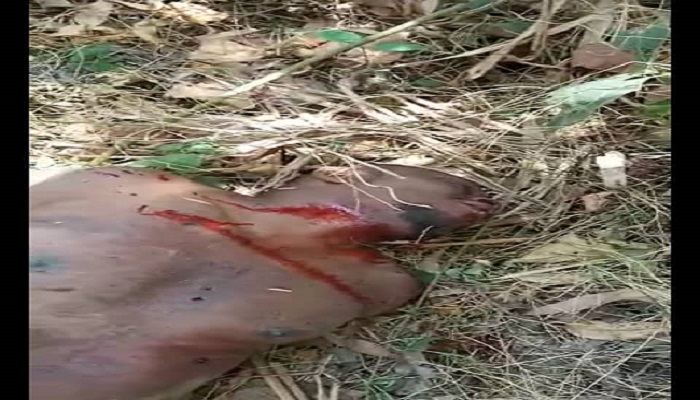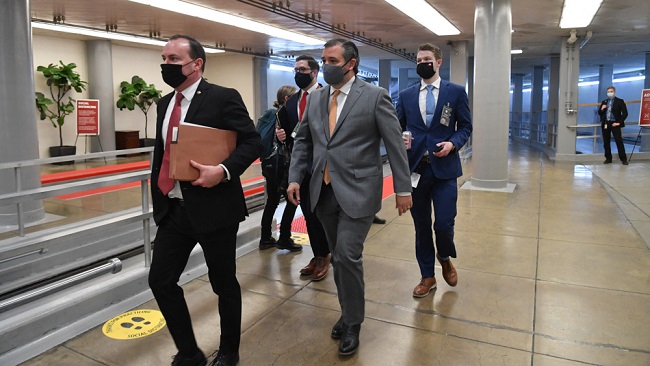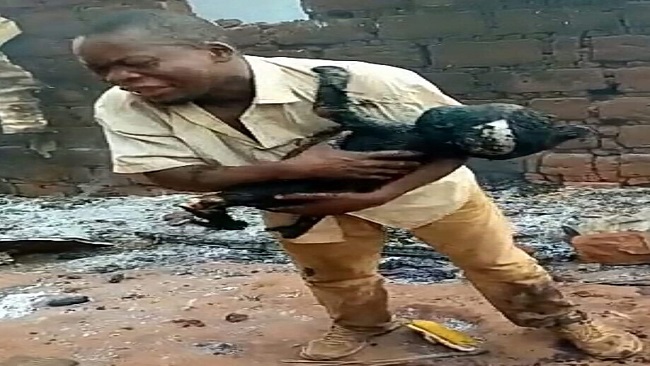12, February 2021
The world silent on ongoing French Cameroun regime’s genocide in Southern Cameroons 0
A prominent Southern Cameroons academic, Professor Carlson Anyangwe says La Republique du Cameroun and its supporters in Paris, France continue their genocide in the Federal Republic of Ambazonia without a word of protest from the European Union or the so-called human rights defenders.
Addressing a Southern Cameroons Interim Government open session on Thursday, Prof Anyangwe said the French Cameroun criminal syndicate in Yaoundé launched its war on the Ambazonian people at a time when the Southern Cameroons Interim Government was trying to get the Federal Republic of Ambazonia out of an economic crisis caused by fifty-eight years of excruciating life under genocide, terror, economic terrorism, and all forms of international criminality imaginable.
The much respected Southern Cameroon elite said, “La Republique du Cameroun and other French vassal states in the so-called CEMAC region harboring France’s proxy army of occupation have been trying to carve up, exploit, and pauperize Southern Cameroons and its people for 59 years,” adding that both the late French Cameroun dictator Ahmadou Ahidjo and President Paul Biya have dutifully followed the French policy of assimilation programs until the people of Southern Cameroons now say they have gotten enough.
During the Thursday zoom meeting in the presence of the Ambazonia exiled leader, Dabney Yerima, Prof Carlson Anyangwe censured Europe’s double standards on human rights but did not say if the EU is complicit in crimes and atrocities perpetrated by the Biya French Cameroun regime against the people of British Southern Cameroons.
At the heart of the crisis, which started in 2016, was a strike by teachers and lawyers, in the English-speaking regions of Cameroon. The professionals, supported by citizens of their areas, protested the unfair use of the French language and unjustified appointments of French speakers in their territories. Cameroon is a bilingual country. By 2017, the situation had spiralled out of control and developed into a fully-fledged separatist war. Both government forces and separatists are now bogged down in a conflict that observers say, can only be resolved through dialogue.
On 8 September 2020, the Foreign Affairs Committee, of the United States Congress introduced Resolution 684 on the crisis in the Cameroonian regions of the North-West and South-West which was adopted on 1 January 2021.
The US Congress (Senate and House of Representatives) did call on “the government of Cameroon and the separatist armed groups in the English-speaking regions of the North-West and South-West to put an end to all violence, to respect the human rights of all Cameroonians, and to pursue a truly inclusive dialogue with a view to resolving the ongoing civil conflict in English-speaking Cameroon”.
Resolution 684 condemned the abuses committed by state security forces and armed groups in the northwest and southwest regions of Cameroon, and affirms that the United States continues to hold the Government of Cameroon accountable for safeguarding the security and constitutional rights of all its citizens, regardless of region, religion, or political opinion. In addition, it urges all parties to the conflict in Cameroon, the Government of Cameroon, U.S. foreign relations entities, and members of the international community to take specific steps to resolve the ongoing civil conflict in Cameroon.
The U.S. Congress was also critical of France’s action in the conflict and Resolution 684 stated that “…France maintains considerable interests in Cameroon, including significant economic and security cooperation, but has not sufficiently used its influence to stem atrocities committed in English-speaking regions or to support stronger international action to seek a resolution to the conflict.”
Prof Carlson Anyangwe noted that the French Cameroun aggressors have killed tens of thousands of Southern Cameroonians and committed brutal crimes with help from France and French speaking African countries in the Sub Saharan region.
France is the main supplier of weapons in La Republique du Cameroun’s aggression against Southern Cameroons.
According to independent estimates, the Biya French Cameroun war has claimed more than 5,000 lives.
The UN says more than two million English speaking Cameroonians are in dire need of humanitarian aid, including some 67, 000 thousand suffering from extreme levels of hunger in the Federal Republic of Nigeria.
The Biya French Cameroun war has also taken a heavy toll on the British Southern Cameroons’s infrastructure, destroying hospitals, schools, and businesses.
By Soter Tarh Agbaw-Ebai



























12, February 2021
EU health agency chief says Coronavirus likely here to stay 0
The coronavirus will probably continue to circulate long-term despite the roll-out of vaccines, the head of the EU’s ECDC health agency told AFP on Friday, urging Europe to keep its restrictions in place for now.
“It seems more likely that it would stay” than disappear, Andrea Ammon, the head of the Stockholm-based European Centre for Disease Prevention and Control, said in an interview.
“It seems very well adapted to humans. So we should be prepared that it will remain with us,” she added.
“It wouldn’t be the first virus that is with us forever, so it’s not an unusual feature for a virus.”
While vaccines dramatically reduce the risk of contracting the illness caused by Covid-19, scientists have not yet established with certainty whether they also reduce transmission of the virus.
So when will we know if they do?
“It will still take a few months. You need a certain amount of vaccinated people that you follow. Special studies are now being set up,” Ammon said.
There is particular concern that the vaccines may not be as effective against some variants of the virus, especially the South African and Brazilian ones.
– Running the last kilometres –
Ammon pointed out that vaccines for the seasonal flu have to be adapted annually as the virus that causes it changes.
“It might turn out that (the coronavirus) goes the same way, or that at one point it remains stable and we can use one vaccine for a longer period,” she told AFP.
Ammon called on EU countries to maintain their restrictions despite a decline in cases across much of Europe.
“It’s still a mixed picture… We are really not out of the woods,” she said, noting that all EU members, with the exception of Finland, were still in “an epidemiological situation of serious concern”, according to the ECDC’s criteria.
“Everybody’s fed up with the measures, but when you’re running a long distance course… (you) have to run the last kilometres,” she stressed.
The number of daily cases across Europe is currently around 150,000, compared to around 250,000 a month ago, according to official data compiled by AFP.
Any relaxing of measures has to be done gradually, one measure at a time, “and only when you observe that it’s either stable or further decreasing then you go to the next one.”
The European Union’s vaccination campaign, which began in late December, has gotten off to a rocky start, hampered by a lack of vaccines and delivery delays.
According to official data on Friday, only three percent of people in the EU had received at least one vaccine dose, and 1.4 percent two doses, with a total of 20 million doses administered.
“Everybody’s aiming for that, all the efforts are in that direction,” Ammon said when asked if the goal seemed realistic.
Source: AFP